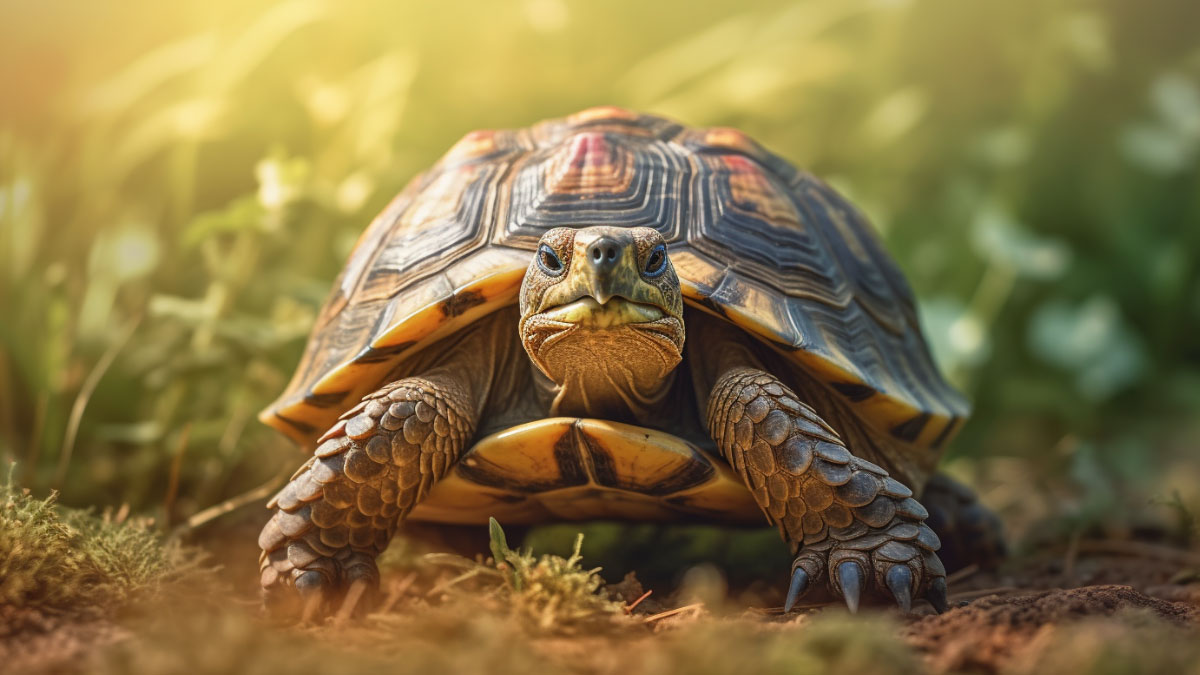Signs Of A Stressed Tortoise You Should Know About
Tortoises are generally hardy creatures and are known to be gentle and sluggish in their action. But various environmental factors or improper care can lead to stress. Recognizing the signs of stress in tortoises will allow you to take timely action and ensure the well-being of your beloved pets.
So what are the signs of a stressed tortoise? You should look for the following symptoms if you doubt your pet tortoise is under stress.
- Shelling up
- Rapid or labored breathing
- Reduced appetite
- Isolation
- Excessive hiding or burrowing
- Reduced activity level
- Aggressive or defensive behavior, etc.
Progressively, we’ll explore the common signs of stress in tortoises. Also, will be shedding light on their causes and offering recommendations for prevention and management.
Signs Of A Stressed Tortoise: Everything Explained
Contents
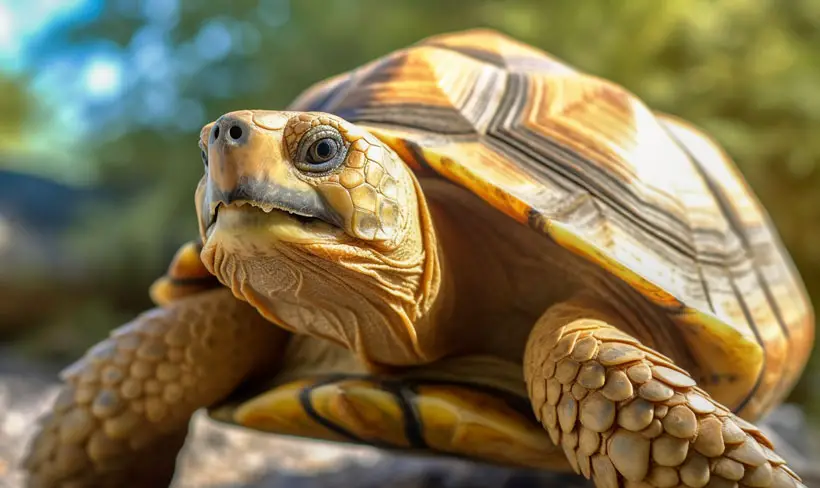
There are some common signs you’d notice your tortoise exhibiting and you’d know he/she is under stress. These signs are classified under 4 points.
- Behavioral changes
- Changes in feeding and drinking habits.
- Shell and skin conditions
- Respiratory issues and others.
1. Behavioral Changes
A stressed tortoise often exhibits noticeable changes in behavior. These changes can be categorized into several key aspects, such as:
- Increased Hiding: Stressed tortoises will seek shelter more frequently and spend extended periods in their hides or burrows. They retreat into their shells for a longer time, refusing to come out even for food or basking.
- Reduced Activity Levels: Tortoises under stress may become lethargic in some cases, and display a significant reduction in activity. They move less, explore their enclosure less, or even become inactive for extended periods.
- Aggressive or Defensive Behavior: Stress can trigger defensive responses in tortoises, causing them to display aggressive behavior towards humans or other tortoises.
They may hiss, bite, or ram into objects or other tortoises as a means of protecting themselves or establishing dominance. This can lead to injuries or damage to their enclosure.
2. Feeding and Drinking Habits
Changes in a tortoise’s feeding and drinking habits serve as vital indicators of stress. Watch for the following signs:
- Loss of Appetite: A stressed tortoise loses interest in food, resulting in a decreased appetite. They may refuse their favorite treats or show disinterest in their regular diet.
- Reduced Water Consumption: Stress can also affect a tortoise’s hydration levels. Observe if your tortoise is drinking less water or showing dispassion in soaking or bathing.
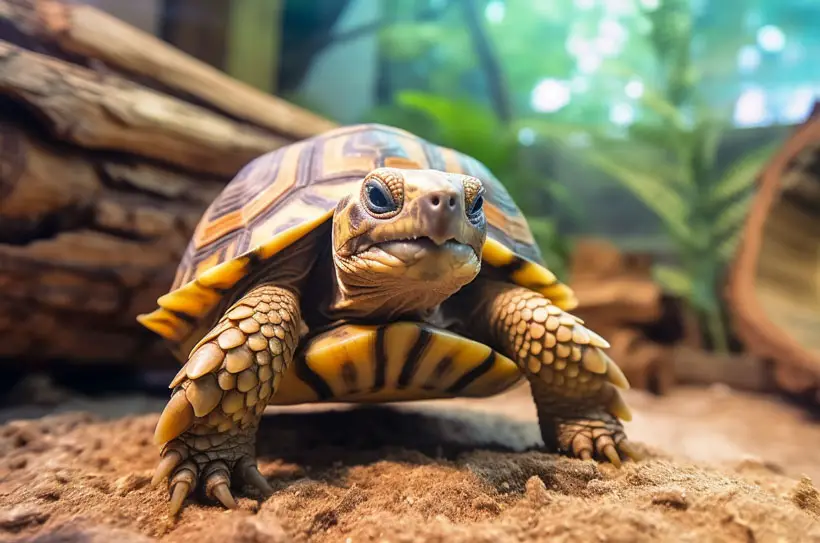
3. Shell and Skin Condition
Stress can manifest in physical changes in a tortoise’s shell and skin. Look out for the following indications:
- Shell Pyramiding or Softening: Pyramiding refers to the development of pyramid-like growth on a tortoise’s shell. Stress can contribute to this abnormal growth pattern. Additionally, a softened shell may indicate a calcium deficiency caused by stress or inadequate nutrition.
- Shell Lifting or Peeling: A stressed tortoise may exhibit signs of shell lifting or peeling. This could be due to poor humidity levels, inadequate diet, or stress-induced behavior.
- Abnormal Shedding, or Skin Problems: Stress can interfere with a tortoise’s normal shedding process, leading to incomplete or irregular skin shedding or peeling. Additionally, skin problems such as dryness, redness, or lesions develop.
4. Respiratory Issues
Stress can compromise a tortoise’s respiratory health, leading to the following symptoms:
- Rapid or Labored Breathing: Observe if your tortoise is breathing heavily or rapidly. This may be an indication of respiratory distress induced by stress.
- Nasal Discharge or Wheezing: Stressed tortoises exhibit nasal discharge or wheezing sounds, suggesting an underlying respiratory issue.
In addition to the mentioned signs above, there are other less specific indications of stress in tortoises, including:
- Weight Loss: Chronic stress can contribute to weight loss in tortoises. Monitor their weight regularly to detect any significant changes.
- Lack of Eye Clarity: Stressed tortoises also develop cloudy or dull eyes, potentially signaling stress-related health issues.
Effects Of Stress On Tortoise
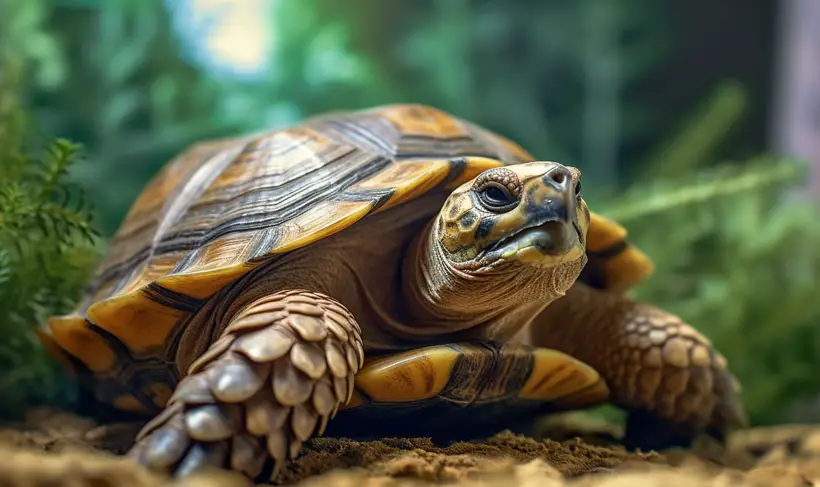
Stress can have various negative effects on tortoises, affecting their physical health, behavior, and overall well-being. Here are some common effects of stress in tortoises:
- Reproductive problems: Stress can interfere with the reproductive health of tortoises. In females, it may lead to egg retention or complications during egg-laying, resulting in egg-binding. In males, stress can reduce fertility and mating behaviors.
- Altered growth and development: Chronic stress during the early stages of a tortoise’s life can have long-term effects on its growth and development. It can lead to stunted growth, developmental abnormalities, or delayed maturation.
How To Manage Stress In Tortoise?
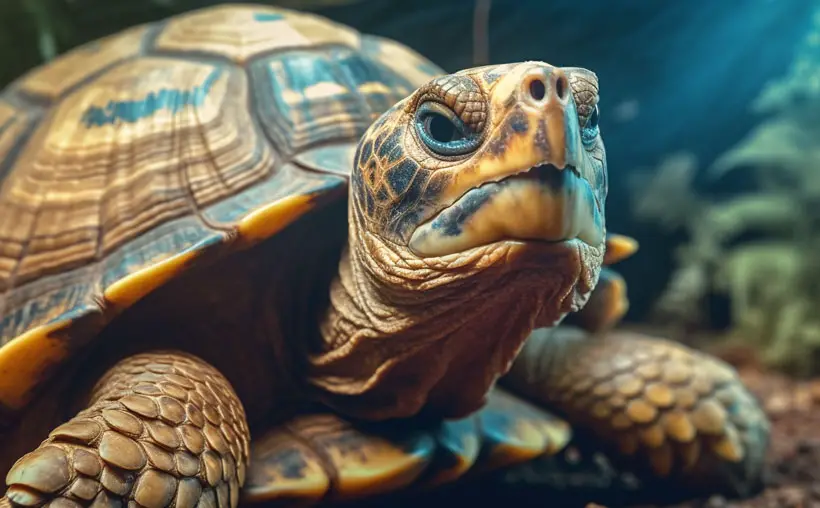
Managing stress in tortoises involves creating a suitable environment and providing proper care to promote their well-being. Here are some strategies to help reduce stress in tortoises:
Enclosure Setup
Ensure that the tortoise’s enclosure is spacious, secure, and designed to meet its specific needs. Provide hiding places, such as logs or rocks, where the tortoise can retreat when it wants to feel secure.
Create a temperature gradient within the enclosure, allowing the tortoise to regulate its body temperature effectively.
Proper Diet And Hydration
Offer a balanced diet consisting of appropriate vegetation and, if necessary, calcium and vitamin supplements. Provide fresh, clean water at all times to ensure proper hydration.
Environmental Enrichment
Stimulate the tortoise’s natural behaviors by adding enrichment items to its enclosure. This can include shallow water dishes for soaking, rocks or logs for climbing, and even safe toys or objects for exploration. Environmental enrichment helps keep tortoises mentally stimulated and prevents boredom.

Regular Exercise
Encourage regular exercise for your tortoise by providing opportunities for it to move around freely. Outdoor enclosures or supervised outdoor time can be beneficial, allowing the tortoise to explore and graze on natural vegetation.
Minimize Disturbances
Avoid sudden loud noises, frequent handling, or any other disturbances that may startle or stress the tortoise. Keep the enclosure in a quiet area away from high traffic or noise levels.
Maintain a Consistent Routine
Establish a regular feeding schedule and maintain a consistent daily routine. Tortoises thrive on predictability, and a consistent routine can help reduce stress and provide a sense of security.
Monitor Temperature and Humidity
Ensure that the temperature and humidity levels in the enclosure are appropriate for the tortoise species. The appropriate temperature for a tortoise is 30°C. Tortoises require specific environmental conditions to thrive, so it’s essential to maintain these parameters within the optimal range.
Veterinary Care
Schedule regular check-ups, like 6 months to 1 year with a reptile veterinarian to monitor the tortoise’s health and address any potential issues early on. A professional can provide guidance specific to your tortoise’s species and individual needs.
Remember, every tortoise is unique, and it’s important to observe your tortoise’s behavior and adjust its care accordingly. If you notice signs of stress or any concerning behaviors, consult with a reptile veterinarian for personalized advice and assistance.
FAQs
Here are some questions people also ask about the signs of a stressed tortoise and the answers to them.
Of course, stress can take the life of a tortoise, but this happens on rare occasions.
Chamomile can be mixed with their diet, it helps to relieve stress and anxiety in tortoises and every other animal. Vitamin C is also a good stress reliever and vitamin E helps to boost the immune system. Vitamin C is found in almost all fruits and vegetables and Vitamin E is found in spinach, avocado, almond, asparagus, broccoli etc.
Yeah, some tortoise species may benefit from limited social interaction, however, it’s essential to monitor their behavior closely to ensure they are not exhibiting signs of stress or aggression. Some tortoises prefer solitary lifestyles and may become stressed when forced into social situations.
Final Words
Stress can have detrimental effects on tortoises, impacting their physical health, behavior, and overall well-being. It is crucial to create a suitable and stress-free environment for them to thrive.
Ensure to provide a spacious enclosure, give a proper diet and seek veterinary care when needed. That way you can effectively manage and reduce stress in tortoises.
Remember to observe your tortoise closely, and if you notice any signs of stress or concerning behaviors, consult with a reptile veterinarian. By prioritizing their welfare and addressing their stress, you can help ensure that your tortoise leads a healthy and fulfilling life.

